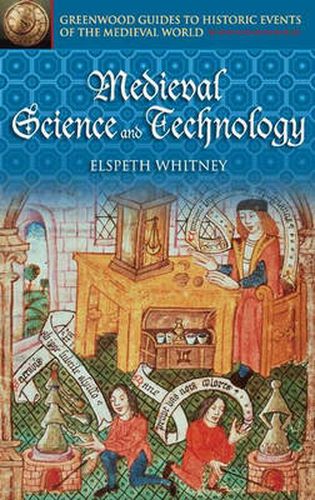Readings Newsletter
Become a Readings Member to make your shopping experience even easier.
Sign in or sign up for free!
You’re not far away from qualifying for FREE standard shipping within Australia
You’ve qualified for FREE standard shipping within Australia
The cart is loading…






Medieval practitioners of the natural arts and mechanical arts - as scientists and craftsmen of the day called their trades - were powerfully influenced by Christianity and by ancient ideas dating back to Plato, Aristotle, and Ptolemy. While medieval science and technology did not seek to overthrow the prevailing views of the time, their accomplishments did lay the groundwork for the scientific revolution and European global expansion of the early modern age. The book begins by introducing the basic concepts of the Classical Tradition, and explains how these ideas were promulgated by the ancient Greeks, were preserved and developed by the great Muslim scholars of the early middle ages, and finally transmitted into western Europe as that region began to grow and expand around 1100 C.E. Aristotle’s natural philosophy is then given an extended treatment, since his descriptions of the natural world provided the intellectual jumping-off point used by every person grappling with the nature of nature during the Middle Ages. Specific avenues of inquiry such as Astronomy and Astrology, Optics, Chemistry and Alchemy, Zoology, Geography, and Medicine are carefully and clearly described on their own terms. Rounding out this engaging work is a discussion of the many innovations from the medieval age, such as mechanical clocks, firearms, and the blast furnace. Biographical sketches provide insight into the lives and accomplishments of twenty men and women whose works profoundly shaped the era’s scientific spirit. Eleven annotated key primary documents afford a fascinating glimpse into how the best minds of the time posed their questions and their answers. An annotated timeline, glossary of terms, illustrations, and an annotated bibliography complete the work.
$9.00 standard shipping within Australia
FREE standard shipping within Australia for orders over $100.00
Express & International shipping calculated at checkout
Medieval practitioners of the natural arts and mechanical arts - as scientists and craftsmen of the day called their trades - were powerfully influenced by Christianity and by ancient ideas dating back to Plato, Aristotle, and Ptolemy. While medieval science and technology did not seek to overthrow the prevailing views of the time, their accomplishments did lay the groundwork for the scientific revolution and European global expansion of the early modern age. The book begins by introducing the basic concepts of the Classical Tradition, and explains how these ideas were promulgated by the ancient Greeks, were preserved and developed by the great Muslim scholars of the early middle ages, and finally transmitted into western Europe as that region began to grow and expand around 1100 C.E. Aristotle’s natural philosophy is then given an extended treatment, since his descriptions of the natural world provided the intellectual jumping-off point used by every person grappling with the nature of nature during the Middle Ages. Specific avenues of inquiry such as Astronomy and Astrology, Optics, Chemistry and Alchemy, Zoology, Geography, and Medicine are carefully and clearly described on their own terms. Rounding out this engaging work is a discussion of the many innovations from the medieval age, such as mechanical clocks, firearms, and the blast furnace. Biographical sketches provide insight into the lives and accomplishments of twenty men and women whose works profoundly shaped the era’s scientific spirit. Eleven annotated key primary documents afford a fascinating glimpse into how the best minds of the time posed their questions and their answers. An annotated timeline, glossary of terms, illustrations, and an annotated bibliography complete the work.